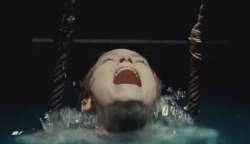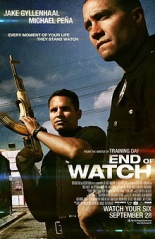
 Disclaimer: I don’t usually watch cop movies. I find them to be of one extreme or the other. Either the cops are portrayed as noble and by-the-book, even if it means the perpetrators are allowed to go free (which veers so far from reality that you may as well affix the “fantasy” label), or portrayed as so corrupt that the film descends into ridiculousness, like Training Day.
Disclaimer: I don’t usually watch cop movies. I find them to be of one extreme or the other. Either the cops are portrayed as noble and by-the-book, even if it means the perpetrators are allowed to go free (which veers so far from reality that you may as well affix the “fantasy” label), or portrayed as so corrupt that the film descends into ridiculousness, like Training Day.
Speaking of Training Day, its screenwriter, David Ayer, is the writer and director of End of Watch, starring Jake Gyllenhaal (Donnie Darko) and Michael Peña (30 Minutes or Less) as two uniformed patrolmen in South Central L.A. The movies have several points in common: the street language, sudden eruption of gut-wrenching violence, and the portrayal of the police as modern-day cowboys attempting to tame an ever-increasing lawless territory.
 The heart of the film is the bromance between Gyllenhaal and Peña, partners who aggravate and pick on each other like brothers and, of course, love and trust each other unconditionally. Although the movie periodically strays from gritty realism into Hollywood hyperbole, the chemistry between the two leads sparkle. Both actors shine.
The heart of the film is the bromance between Gyllenhaal and Peña, partners who aggravate and pick on each other like brothers and, of course, love and trust each other unconditionally. Although the movie periodically strays from gritty realism into Hollywood hyperbole, the chemistry between the two leads sparkle. Both actors shine.
Unfortunately, much like Training Day, the movie lost me during its third act, when it trades realism for the needless and implausible plot development of a Mexican drug cartel putting a hit out on our street-cop protagonists. There are some jarring time jumps that may have you wondering if the story is unfolding in a matter of days, weeks or months. And can we retire the handheld camera mode of storytelling?
Some parts come perilously close to being a recruiting film for the police (much like Top Gun drummed up enlistees for the military), but don’t see it for that or the tacked-on violent climax. See it for the Gyllenhaal and Peña, and some scenes that will make you wish they had never stepped foot out of their squad car. —Slade Grayson

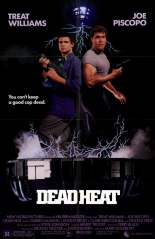
 Not to date myself, but I remember a time when Joe Piscopo told punch lines instead of being one. He was great on
Not to date myself, but I remember a time when Joe Piscopo told punch lines instead of being one. He was great on 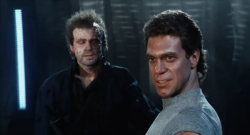

 No sooner has thieving murderer Joe Breezi (Andy Warhol regular Joe Dallesandro) escaped from prison to sweet freedom than he kills a couple of farmers, stabbing one with the elderly guy’s own pitchfork. At least he has good reason: Joe needs their car to drive to the two-room countryside cottage in which he buried 300 million liras five years prior, underneath the fireplace.
No sooner has thieving murderer Joe Breezi (Andy Warhol regular Joe Dallesandro) escaped from prison to sweet freedom than he kills a couple of farmers, stabbing one with the elderly guy’s own pitchfork. At least he has good reason: Joe needs their car to drive to the two-room countryside cottage in which he buried 300 million liras five years prior, underneath the fireplace.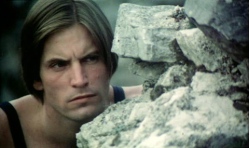
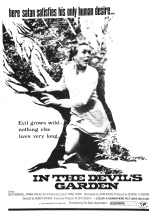
 My dad always told me that the shortest distance between two points is a straight line. What he failed to mention is that a rapist may be hanging out somewhere around the middle. That’s the case for the pink-skirted schoolgirls who, while on their way home, take a shortcut
My dad always told me that the shortest distance between two points is a straight line. What he failed to mention is that a rapist may be hanging out somewhere around the middle. That’s the case for the pink-skirted schoolgirls who, while on their way home, take a shortcut 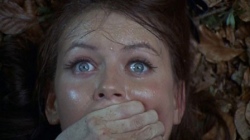
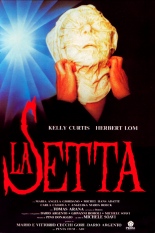
 I hadn’t heard anything about
I hadn’t heard anything about 